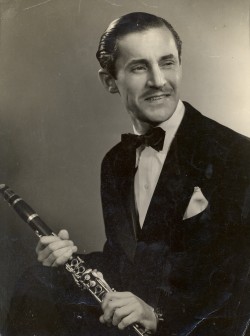|
NAT TEMPLE
Saxophone and clarinet player turned
bandleader
 |
|
Nat Temple |
|
|
|
|
In a
career that stretched from 1929 to 2003, Nat Temple successfully
straddled two aspects of professional music-making. Firstly, in
the prewar period, he was one of Britain’s most outstanding
instrumental soloists, playing the alto saxophone and clarinet
in the bands of Harry and Syd Roy, Ambrose, and Geraldo.
Secondly, after a chance meeting with the Canadian-born comedian
Bernard Braden, he became one of the leading postwar bandleaders
for radio and television, providing music for everything from
the children’s show Crackerjack to the mainstream entertainment
of Russell Harty and Noel Edmonds.
Born
Nathan Temple, he grew up in Tower Hamlets, East London, where
his father was a tailor. In 1927 Temple took up the saxophone
and after an apprenticeship with the singer and broadcaster Sam
Costa from 1929, and a short spell with Gaby Robins’s orchestra,
he joined the RKO-leans, led by the pianist Syd Roy. This was
the house band of the RKO cinema in Leicester Square, and it
also featured the two-piano act of Ivor Moreton and Dave Kaye
among its personnel.
These
two pianists and Temple then moved to join the more
jazz-orientated group led by Roy’s reed-playing brother Harry,
and in it Temple blossomed, turning in some of the most polished
British jazz solos of the era in his saxophone contributions to
such discs as 12th Street Rag and Roy Rag — the latter piece
featured by Roy’s “band-within-a-band”, the Ragamuffins. He also
admitted recently that it was he, rather than Roy himself, who
played the more sparkling clarinet solos on the band’s records,
although at the time Roy took the credit and paid Temple extra
to keep quiet about his contributions.
Roy was
not only a society band leader at venues such as the London
Pavilion and the Café Anglais, but he broadcast nationally,
notably during a two-year engagement at the Mayfair Hotel. Hence
Temple’s playing was heard by a large audience, and he continued
to be Roy’s main soloist, even though the band’s work became
more intermittent after its leader’s wedding to the Rajah of
Sarawak’s daughter, his entry into European high society, and a
tour to South America. By 1939 Roy was back at the Café Anglais,
eventually transferring to the Embassy Club in 1940, but at that
time Temple was called up, and joined the band of the Grenadier
Guards.
Although
this involved tours of duty to North Africa, among other places,
Temple managed to fit in recording sessions when he was in
London, appearing on disc with Geraldo, Ambrose and Joe Daniels.
After
demobilisation, Temple formed his own Club Royal Orchestra in
1947, playing commercial and society engagements from hunt balls
to hotel dances, as well as seasons in that nascent postwar
institution, the Butlins holiday camp. His own virtuoso playing
now took a back seat to his activities as a leader and
organiser, and by the time he started working on radio and
television, with first Breakfast . . . and later Bedtime with
Braden, he was assuming the persona of a genial if somewhat
bumbling bandleader. This was a role he played to perfection,
while creating music of the very highest professional standards
for broadcasters such as Michael Bentine, Dick Emery, Frankie
Howerd and Peter Ustinov. He was also to accompany a huge range
of stars on record, including Hoagy Carmichael, Eartha Kitt and
Mel Tormé.
After
his heyday on television and radio, Temple continued to lead a
quintet throughout the 1980s and 1990s, in which he once again
played clarinet and saxophone more prominently, finally retiring
on his 90th birthday.
He is
survived by his four daughters, one of whom, Mandy, directed the
film Igor, Child of Chernobyl, for which Temple won an Emmy for
his soundtrack score in 1995. He had previously won the highest
honour of the British Academy of Songwriters, Composers and
Authors, the Gold Badge of Merit, in 1993.
Nat Temple, bandleader and saxophonist, was born on July 18,
1913. He died on May 30, 2008, aged 94. |